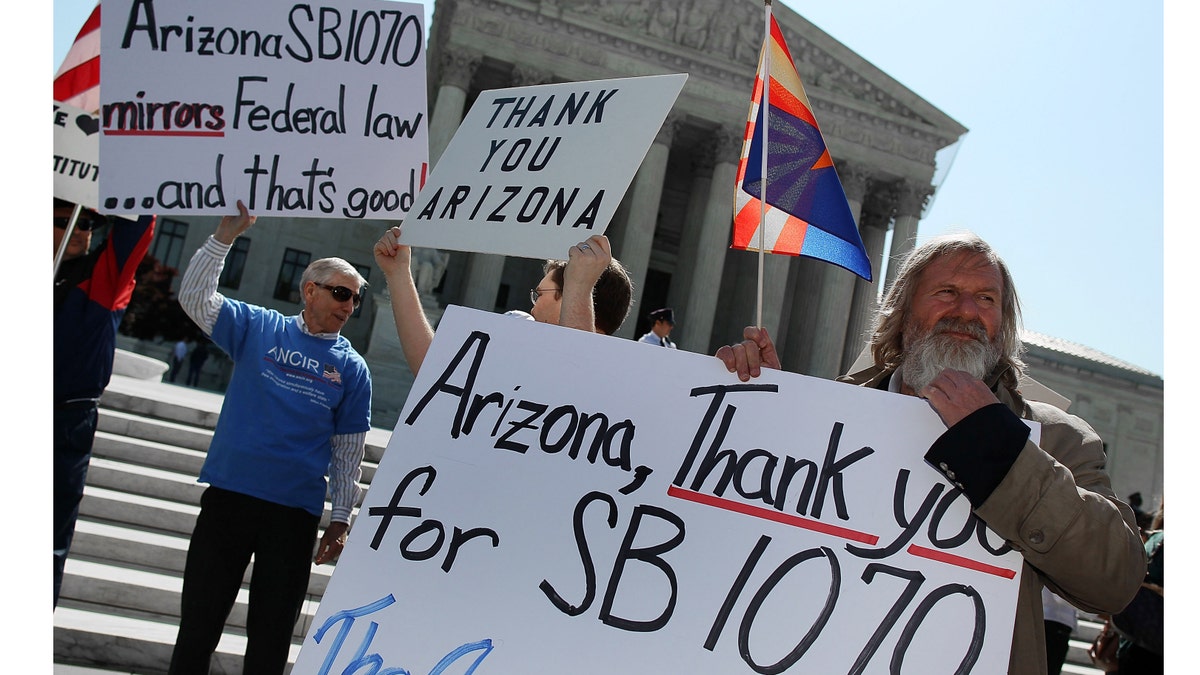
WASHINGTON, DC - APRIL 25: People protest in front of the U.S. Supreme Court, on April 25, 2012 in Washington, DC. Later this morning the high court will hear arguments on Arizona v. United States and will be tasked with deciding the conflicting roles of national and state governments in controlling the lives of noncitizens living illegally in the U.S. while deciding the constitutionality of Arizona's immigration law SB 1070. (Photo by Mark Wilson/Getty Images) (2012 Getty Images)
The Supreme Court today handed the State of Arizona a hard fought victory in upholding the most contentious part of the state’s immigration enforcement bill, section 2(b) of SB 1070. That section requires state and local enforcement officials to verify with the federal government the immigration status of people they lawfully stop when they suspect unlawful presence. This authority, the court held, is authorized by federal law and a basic component of a state’s inherent enforcement function. Despite the determined opposition of the Obama Administration and its allies, states can and will be full partners in assisting in enforcing our national immigration laws.
FAIR will be working hard in states all across America to try to build on this and other legal successes that help affirm the states’ role in solving America’s immigration crisis.
Although the court struck down several other provisions of the Arizona law – including the one that penalized aliens in the country illegally seeking unauthorized employment, Justice Kennedy’s majority opinion makes it clear that it respects Congress’ wide-ranging authority to authorize states to assist in a variety of areas of immigration law enforcement.
All other portions of the Arizona law might be found legal and constitutional, it seems, if Congress would state so explicitly in federal law. In each case where the court struck down a portion of the Arizona law, the court could not find explicit evidence of congressional intent to allow a state like Arizona to enact such a law.
The decision should serve as a clarion call to Congress to step forward and lead: Congress can now – and must -- step forward and authorize states to act in these areas.
For anyone who takes the effort to review numerous immigration laws enacted over many years, of course, Congress has already given the green light to these kinds of laws.
But the five justices joining the majority opinion apparently could not locate the various sections of the Immigration and Nationality Act where Congress sought to encourage this sort of state-federal cooperation. That, by itself, would have been a setback for those who want real enforcement and credibility to our immigration limits. But it gets worse. The court went further and inexplicably embraced the Obama Administration’s claims of inherent and apparently unreviewable executive “prosecutorial discretion” (as it calls it), a series of memos that the Department of Homeland Security (DHS) says authorize it to simply allow millions of illegal immigrants to apply to remain in the Unites States indefinitely.
In effect, the majority of the justices upheld (embraced, really) the Obama Administration’s incredible claim that when it comes to visa and border enforcement “we don’t have to, and states can’t make us.” For citizens and taxpayers, this is a massive threat to national and community self-determination, not to mention fiscal health. A politician, as President Obama has just shown, can now use special immigration favors for partisan political gamesmanship at taxpayers’ expense.
The majority opinion dutifully nods to the incredible public safety and fiscal challenges poses by Arizona’s border crisis, but simply dismisses the problem as something that the state has very little say in stopping. This is both irresponsible and unsustainable: decision-making has been divided between those who make the decisions and those who must absorb the consequences. Local communities must be empowered to assert reasonable control over their destinies. Without effective state-federal partnerships in immigration enforcement, our very viability as a national enterprise is at stake.
The battle has only just begun. The American people, who overwhelmingly favor the sort of enforcement strategy laid out in SB 1070, maintain the ultimate power to ensure that their elected officials enact and enforce immigration laws in a way that truly protects their interests.












































